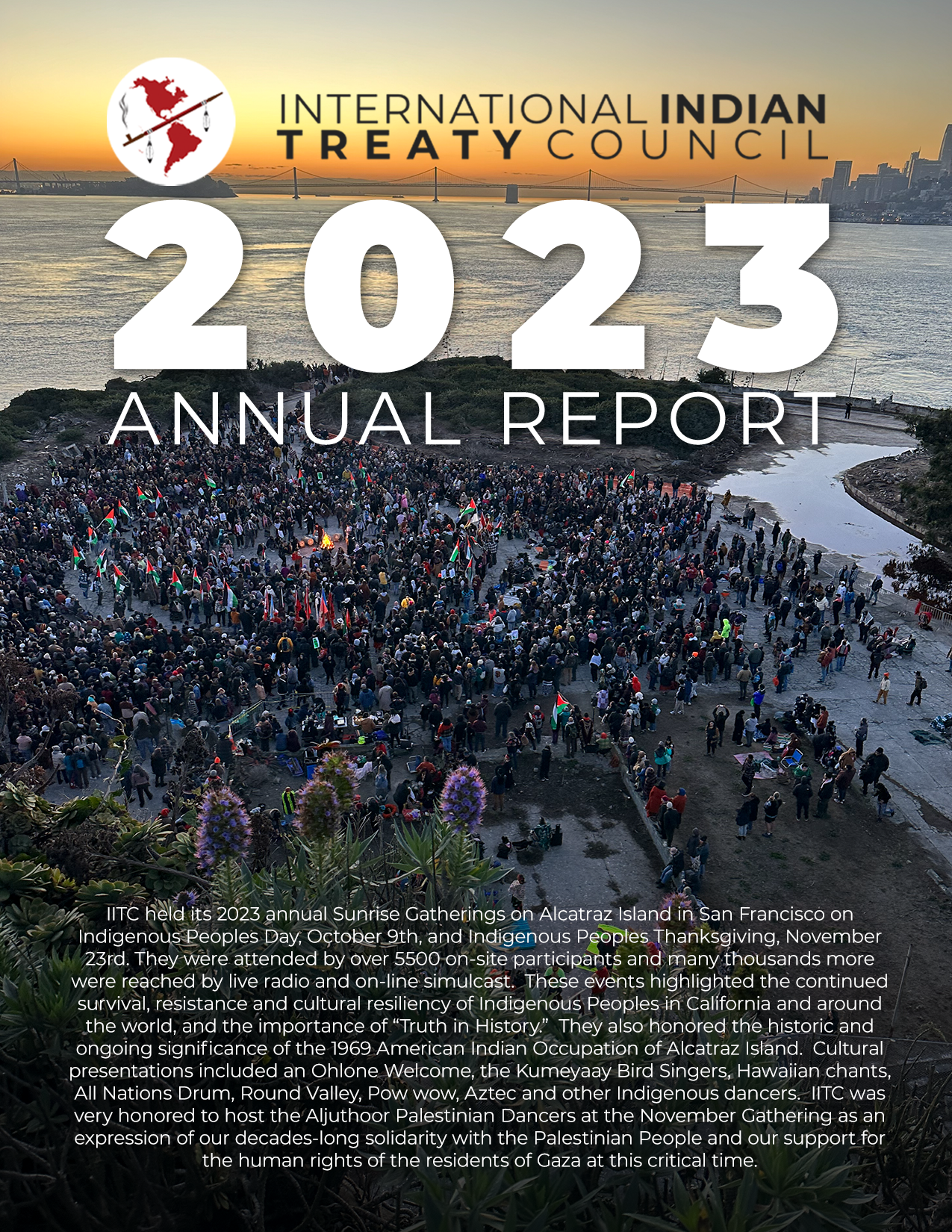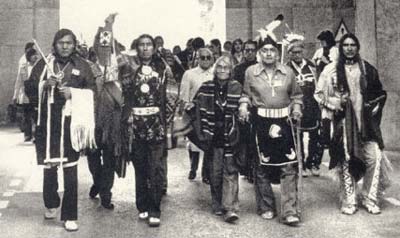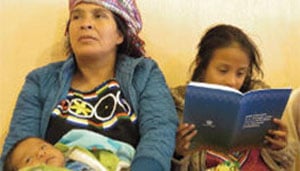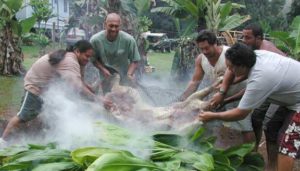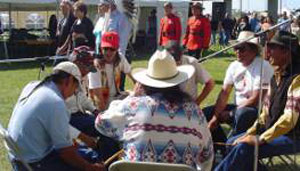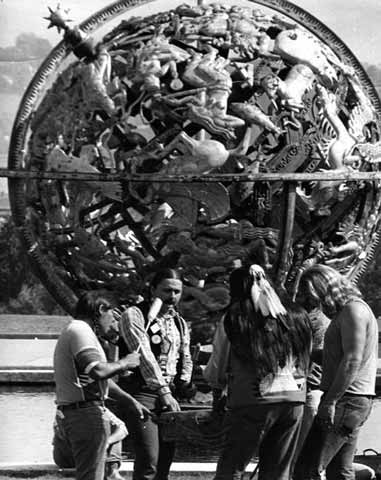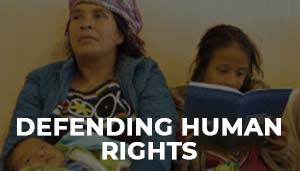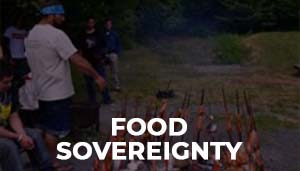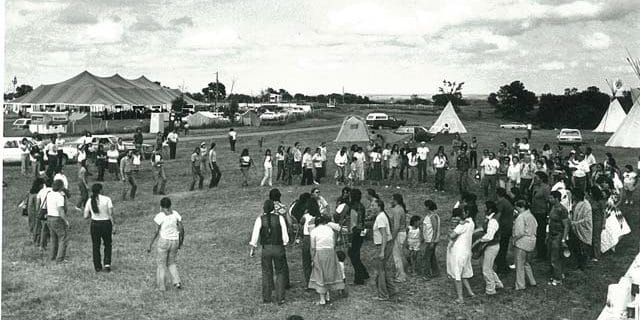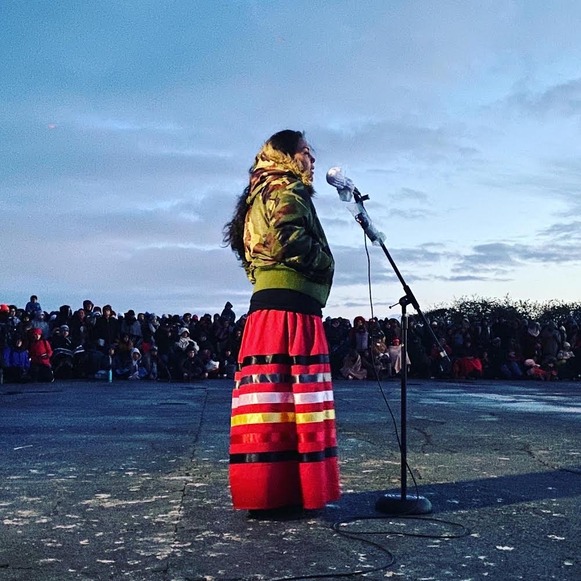

A Victory for California Indigenous Peoples: AB 2022 Signed into Law on September 23, 2022, Prohibiting Racist Place Names in California
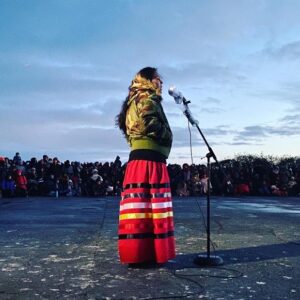
Morning Star Gali, Pit River Tribe and IITC’s California Tribal and Community Liaison, addressed the epidemic of Missing and Murdered Indigenous Women in California and the links to demeaning and racist place names at IITC’s annual Sunrise Gathering on Alcatraz, November 28, 2019
SACRAMENTO, CALIFORNIA: On September 23rd, 2022, AB 2022 was signed into law by California Governor Gavin Newsom. It codifies the prohibition of the use of the racist and misogynist slur “squaw” (hereinafter, the “s word”) for geographic features and place names In California. AB 2022 creates a statewide process to replace these offensive names in partnership with California Tribes and the Native American Heritage Commission. Its adoption is in accordance with United States Secretary of Interior Deb Haaland’s Secretarial orders 3404 and 3405 issued in November 2021, which initiated a similar process on the federal level.
The International Indian Treaty Council (IITC) has had an office in San Francisco since 1978 and greatly values its relationship with Tribal Nations throughout California. IITC first took a stand on this issue in 2003 in support of the Washoe Tribes’ call to rename the “Squaw Valley” ski resort located on its ancestral lands near Lake Tahoe which was the site of the 1960 Olympics. Although the official place name was finally changed to Palisades Tahoe in 2021, we note that the name of the resort’s hotel has not been changed on its web page as of this date.
Across California, there are over 100 geographic features that use the “S” word. The “S” word is a profoundly offensive term that epitomizes the racism and sexism Native American women have faced in the United States since the beginning of colonial contact.
During the California Gold Rush, Indigenous women were forced to serve as sexual and domestic slaves for miners and other settlers. Today the epidemic of violence against Indigenous women in California and throughout the U.S. includes disproportional levels of sexual violence, rape and murder. California Indigenous women that led the campaign for the passage of AB 2022 emphasized that the depiction of Indigenous women as demeaned and sexualized by the widespread use of the “S” word for place names throughout California has contributed to the culture of impunity and invisibility which perpetuates this violence. California has the fifth-highest number of Missing and Murdered Indigenous Women, Girls and Two-spirit people in the United States. Today, more than 4 in 5 Indigenous women in the U.S. report having experienced violence, and more than 1 in 2 have experienced sexual violence.
“AB2022 represents the collaborative work of Tribal advocates, grassroots community partners, and elected state officials to address the relationship between violence against Native California lands and violence against California Native women and girls. The public use of racial slurs and epithets in place names furthers racial discrimination, injustice and human rights violations that we continue to experience” stated Morning Star Gali, IITC’s Tribal and Community Liaison and one of the Indigenous women leaders in this campaign.
She added that “renaming Indigenous places to respect California Indian Peoples’ ancestral relationships to our own lands is a move towards healing for Indigenous communities and building more positive relations with the people of this state. It is particularly important to those of us who have survived violence and discrimination and are working on a daily basis for healing, truth in history and justice.”
AB 2022 commits the State of California to work with Indigenous leaders and knowledge holders to identify all sites and areas where racist and offensive place names in California exist, and establishes a process for state agencies and local governing bodies to identify new names based on Indigenous place names. It also prohibits the use of the “s” word in the future.
The International Indian Treaty Council welcomes the passage of AB 2022 as a necessary step by the State of California to address the impacts of its history of racism and genocide against Indigenous Peoples. This includes the ongoing impacts of the California Gold Rush, termination and relocation policies, misrepresentation in state education systems, forced assimilation including boarding schools and forced work programs carried out with state complicity and, in many cases, direct state involvement.
The IITC looks forward to full implementation of AB2022 with the full and effective participation of California Indigenous Tribes, Nations and Peoples.
###
El Consejo Internacional de Tratados Indios (CITI) es una organización de Pueblos Indígenas del Sur, Centro y Norteamérica, el Caribe y el Pacífico, que trabaja por la soberanía y la libre determinación de los Pueblos Indígenas, así como el reconocimiento y protección de los derechos indígenas, tratados, culturas tradicionales y tierras sagradas
Compartir esta publicación
A Victory for California Indigenous Peoples

A Victory for California Indigenous Peoples: AB 2022 Signed into Law on September 23, 2022, Prohibiting Racist Place Names in California

Morning Star Gali, Pit River Tribe and IITC’s California Tribal and Community Liaison, addressed the epidemic of Missing and Murdered Indigenous Women in California and the links to demeaning and racist place names at IITC’s annual Sunrise Gathering on Alcatraz, November 28, 2019
SACRAMENTO, CALIFORNIA: On September 23rd, 2022, AB 2022 was signed into law by California Governor Gavin Newsom. It codifies the prohibition of the use of the racist and misogynist slur “squaw” (hereinafter, the “s word”) for geographic features and place names In California. AB 2022 creates a statewide process to replace these offensive names in partnership with California Tribes and the Native American Heritage Commission. Its adoption is in accordance with United States Secretary of Interior Deb Haaland’s Secretarial orders 3404 and 3405 issued in November 2021, which initiated a similar process on the federal level.
The International Indian Treaty Council (IITC) has had an office in San Francisco since 1978 and greatly values its relationship with Tribal Nations throughout California. IITC first took a stand on this issue in 2003 in support of the Washoe Tribes’ call to rename the “Squaw Valley” ski resort located on its ancestral lands near Lake Tahoe which was the site of the 1960 Olympics. Although the official place name was finally changed to Palisades Tahoe in 2021, we note that the name of the resort’s hotel has not been changed on its web page as of this date.
Across California, there are over 100 geographic features that use the “S” word. The “S” word is a profoundly offensive term that epitomizes the racism and sexism Native American women have faced in the United States since the beginning of colonial contact.
During the California Gold Rush, Indigenous women were forced to serve as sexual and domestic slaves for miners and other settlers. Today the epidemic of violence against Indigenous women in California and throughout the U.S. includes disproportional levels of sexual violence, rape and murder. California Indigenous women that led the campaign for the passage of AB 2022 emphasized that the depiction of Indigenous women as demeaned and sexualized by the widespread use of the “S” word for place names throughout California has contributed to the culture of impunity and invisibility which perpetuates this violence. California has the fifth-highest number of Missing and Murdered Indigenous Women, Girls and Two-spirit people in the United States. Today, more than 4 in 5 Indigenous women in the U.S. report having experienced violence, and more than 1 in 2 have experienced sexual violence.
“AB2022 represents the collaborative work of Tribal advocates, grassroots community partners, and elected state officials to address the relationship between violence against Native California lands and violence against California Native women and girls. The public use of racial slurs and epithets in place names furthers racial discrimination, injustice and human rights violations that we continue to experience” stated Morning Star Gali, IITC’s Tribal and Community Liaison and one of the Indigenous women leaders in this campaign.
She added that “renaming Indigenous places to respect California Indian Peoples’ ancestral relationships to our own lands is a move towards healing for Indigenous communities and building more positive relations with the people of this state. It is particularly important to those of us who have survived violence and discrimination and are working on a daily basis for healing, truth in history and justice.”
AB 2022 commits the State of California to work with Indigenous leaders and knowledge holders to identify all sites and areas where racist and offensive place names in California exist, and establishes a process for state agencies and local governing bodies to identify new names based on Indigenous place names. It also prohibits the use of the “s” word in the future.
The International Indian Treaty Council welcomes the passage of AB 2022 as a necessary step by the State of California to address the impacts of its history of racism and genocide against Indigenous Peoples. This includes the ongoing impacts of the California Gold Rush, termination and relocation policies, misrepresentation in state education systems, forced assimilation including boarding schools and forced work programs carried out with state complicity and, in many cases, direct state involvement.
The IITC looks forward to full implementation of AB2022 with the full and effective participation of California Indigenous Tribes, Nations and Peoples.
###
El Consejo Internacional de Tratados Indios (CITI) es una organización de Pueblos Indígenas del Sur, Centro y Norteamérica, el Caribe y el Pacífico, que trabaja por la soberanía y la libre determinación de los Pueblos Indígenas, así como el reconocimiento y protección de los derechos indígenas, tratados, culturas tradicionales y tierras sagradas
